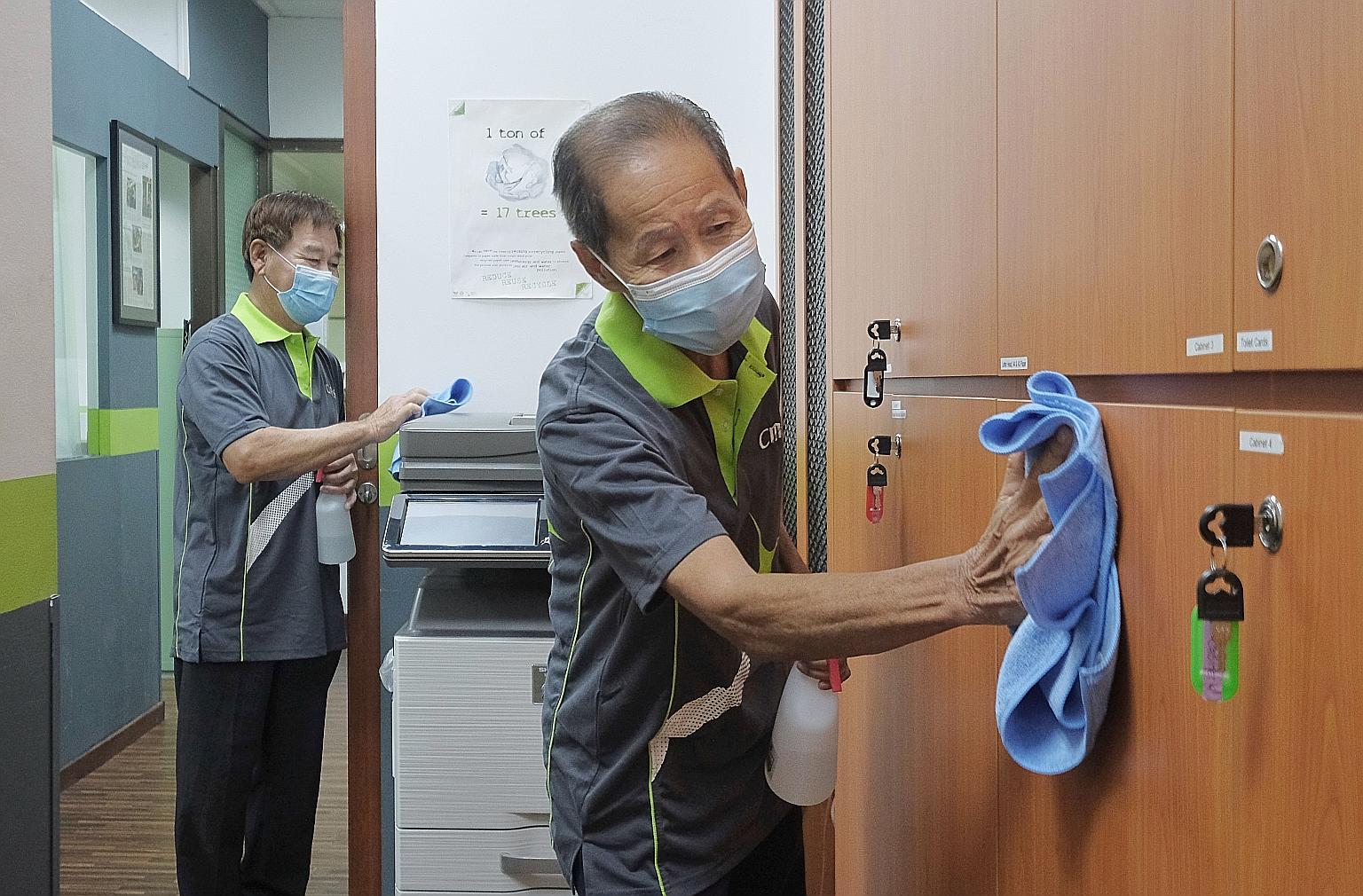COVID-19 SPECIAL
Essential workers: You do it only if you have no other choice, says veteran cleaner
Sign up now: Get ST's newsletters delivered to your inbox

Cleaners Tan Cheng Piew (left), 64, and Pang Tay, 76, at work in an office on Friday. The Covid-19 outbreak has highlighted the plight of essential workers, many of whom continue to go to work often for a low salary, while the rest of Singapore is encouraged to stay at home to work.
ST PHOTO: GAVIN FOO
Follow topic:
If he had more options, Mr Tan Cheng Piew would not do the job he has had for almost a decade.
"It's tiring and can be dirty. And for those with families, it usually does not pay enough to support a household with children," said the 64-year-old cleaner, who, thankfully, does not need to support his three sons in their 30s and 40s.
Mr Tan, who left school after Primary 6, cleans offices in Jalan Buroh.
"Most Singaporeans do not want to work a cleaner's job, you do it only if you have no other choice," he said.
But it is not the worst job for him, he pointed out. "People sometimes ask me why I didn't consider becoming a driver or doing other kinds of jobs, but this is all right for me. In fact, it's less tiring than working in construction," said Mr Tan, who used to be a contractor but stopped when business slowed down.
The Covid-19 outbreak in recent months has highlighted the plight of essential workers, many of whom continue to go to work often for a low salary, while the rest of Singapore is encouraged to stay at home to work.
Mr Tan says he now makes more money than when he started out 10 years ago. He earns about $1,500 a month, $300 more than the basic pay he began with.
It is also higher than the minimum salary of $1,200 mandated by the Progressive Wage Model (PWM) for general cleaners like him.
His current salary works out to a real wage increase of about 6.2 per cent over 10 years, taking inflation into account.
This is an annual real wage increase of 0.6 per cent a year, just barely beating inflation, said Maybank Kim Eng senior economist Chua Hak Bin.
The implementation of the PWM has seen salaries of those in the cleaning industry rise, since it was implemented in 2018.
Minimum salaries are expected to increase further next month to $1,236 for the lowest rung of general and indoor cleaners and at least $1,854 for supervisory roles.
-
$1,500
Current monthly salary of office cleaner Tan Cheng Piew.
$300
The increase in his salary compared with the basic pay he began with about 10 years ago.
6.2%
The real wage increase over 10 years, taking inflation into account. This is an annual real wage increase of 0.6 per cent a year, just barely beating inflation, said Maybank Kim Eng senior economist Chua Hak Bin.
The PWM has been applied to the cleaning, security and landscaping sectors.
But Mr Tan does not grumble about his pay. He says it is enough for him and his wife, who does not work, to get by.
Like Mr Tan, Mr Pang Tay, 76, says most Singaporeans would not choose to clean toilets and offices for a living, and the only ones would be seniors like himself.
"If you have studied and got a certificate, you wouldn't want to do such a job. You would want to work in an office," said Mr Pang, who retired as a lorry driver.
He earns a little over $1,300, up from $1,200 when he first started five years ago.
Both men said they had no feelings about the recent outpouring of gratitude to workers like themselves.
Mr Tan said he understood why people might be grateful someone was doing a job like his.
"That's not weird," said Mr Tan with a laugh, adding that he does not dwell too much on people's perceptions of his job.
"I'll do it as long as I'm able to, as it suits an old person like me."

